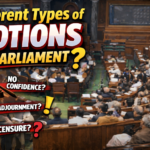US Supreme Court recognizes Donald Trump’s immunity from prosecution

The US Supreme Court in a ruling says that former presidents have full immunity. It saves from prosecution for actions that were within their constitutional powers as president, but not for private acts.
The ruling recognise for the first time any form of presidential immunity from prosecution.
INDIAN PRESIDENT AND GOVERNOR IMMUNITY
ART 361-Protection of President and Governors
It protect The President, or the Governor of a State from criminal proceedings and arrest.
ART 361(1):
They shall not be answerable to any court for the exercise and performance of the powers and duties of their office.
or for any act done or purporting to be done by him in the exercise and performance of those powers and duties.
The article provides the exception if the conduct of the President may be brought under review by any court, tribunal or body appointed or designated by either House of Parliament for the investigation of a charge under article 61 :
Article 361(2):
No one shall institute criminal proceedings against the President or the Governor in any court till their office term.
Art 361 (3):
No process for the arrest or imprisonment of the President, the Governor, shall issue from any court during the office term.
The Supreme Court in the landmark Rameshwar Prasad v Union of India case:
observed that “the position in law is that the Governor enjoys complete immunity.”
IMPUNITY FOR MP’S
“A seven-judge constitution bench led by Chief Justice DY Chandrachud decisively ruled in March 2024 that:
Members of Parliament (MPs) and Members of Legislative Assemblies (MLAs) are not shielded from prosecution for accepting bribes in exchange for delivering speeches or casting votes in the legislature.
This landmark decision overturned the 1998 verdict from a five-judge bench in the JMM bribery case. It had granted immunity/ impunity to MPs and MLAs in such situations. The apex court emphasized that bribery falls outside the realm of parliamentary privileges and contradicts the essence of Articles 105 and 194 of the Constitution. The articles delineate the powers and privileges of MPs and MLAs in Parliament and legislative assemblies respectively. The Supreme Court states that bribery undermines the integrity of public life and the above-mentioned articles will give no protection.
Articles 105 and 194 of the Constitution deal with Privileges.






0 Comments